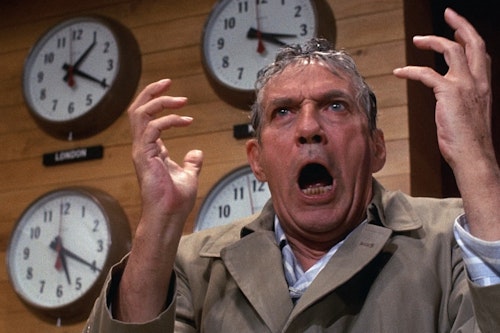The Summer of Our Discontent?

New polls show Donald Trump leading the 17-way Republican presidential primary (25% in the Fox poll and 24% in CNN’s). The Sanders Surge may be slowing, but he’s doubled support between June and August and now trails Secretary Hillary Clinton 29% to 47% in the Democratic primary. Are non-establishment candidates finally poised to win? We wouldn’t bet on it.
Polls demonstrate that most Americans are angry with politics and Washington. Congressional job approval is mired in the teens, falling to 14% this August. President Obama’s job approval is negative. The government itself is now routinely listed among the top problems facing the U.S. Trust in the presidency, the Supreme Court, and Congress are all below historical averages. And economic confidence is down, with a majority (57%) believing things are getting worse.
Republicans are particularly upset with their own party. Republican approval of Republican leaders in Congress is underwater by nine points. And nearly six in ten Republicans say their own party doesn’t represent their views well on government spending, immigration, and marriage equality.
Republican primary voters, and also some Democrats, are expressing frustration with their own parties by supporting other candidates. Exhibit A: Trump’s momentous rise in the polls. He’s gone from a nonstarter to top of the Republican pack, leading amongst every demographic—men, women, younger voters, older voters, Evangelicals, and college and non-college educated voters. And he trails Sec. Clinton by only six points in a hypothetical general election match-up.
On the Democratic side, Sen. Sanders is climbing in the polls, though still trailing Sec. Clinton. He’s doing best with self-identified liberals, 40% of whom said they’d support Sen. Sanders in Fox’s recent poll. And one poll even shows him seven points up on Sec. Clinton in First-in-the-Nation New Hampshire.
But these early polls should be taken with a grain of salt. Trump is leading in Iowa and New Hampshire polls, but he hasn’t racked up many party endorsements, which are highly correlated with primary victors, especially on the Republican side. He may be able to self-fund, but few have shown their support for him with donations. His policy stances are all over the place and often contradictory. To say nothing of his rhetoric. Candidates like Trump tend not to garner the nomination.
On the Democratic side, it’s tempting to draw comparisons to the 2008 primary, when an upstart Senator defeated the supposedly safe Clinton candidacy. But there are notable differences. First, Sen. Sanders may have hit a ceiling in his support. His coalition appears less diverse, and his Iowa numbers have been fairly stable compared to his surge in New Hampshire. That means he will have to work harder to earn more Democratic support. Indeed, New Hampshire can often be an outlier in primaries, with eventual nominees losing the state before winning the nomination. The factors most highly correlated with primary wins—endorsements and fundraising—overwhelming favor Sec. Clinton.
Only three in ten Americans are paying a lot of attention to the 2016 presidential election. (Can you blame them? It’s not for 440+ days.) Right now, partisans are kicking the tires, taking candidates out for a drive. But come election time, primary voters care more about electability than ideology or policy alignment. Nearly eight in ten Democrats say Sec. Clinton has the best chance of any other potential Democratic nominee to win in November 2016. Republican primary voters are more split, but only one-quarter view Trump as their best chance to win in 2016—nearly identical to the number who selected Gov. Bush.
Thinking back to the 2011, lots of candidates had their moment to shine, before losing to Gov. Romney. Michele Bachmann won the Iowa straw poll. She was in sixth place come January. Herman Cain then took the lead, before receiving less than 1% of the vote in both Iowa and New Hampshire. Newt Gingrich stuck around for longer, but ultimately fizzled after Florida. On the Democratic side, Sen. Sanders went on record in 2011 saying a primary challenge to President Obama would “enliven the debate.” None emerged. And in 2011 more than half of Americans said they wanted a third party. Despite this, arguably the most organized faction to deliver on that desire, Americans Elect, failed to gain traction.
Right now, most Americans aren’t thinking too seriously about the 2016 presidential election. And many of the ones who are seem to be channeling their inner Howard Beale—expressing anger and frustration at a federal government that appears incapable of rising to the challenges of the 21st century. But the summer of our discontent will likely end once voting begins in 2016.
Subscribe
Get updates whenever new content is added. We'll never share your email with anyone.
